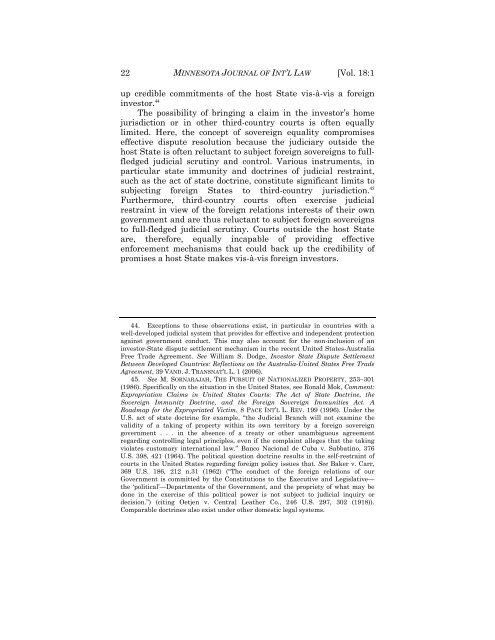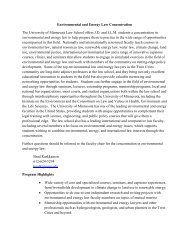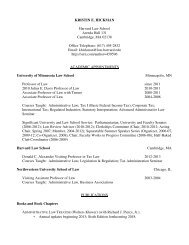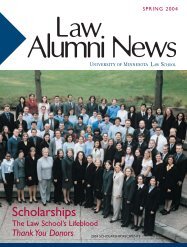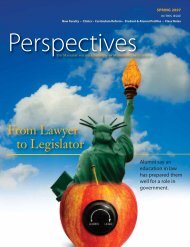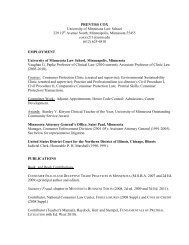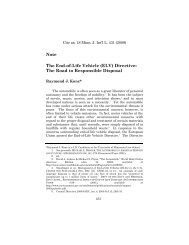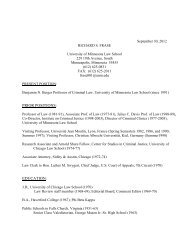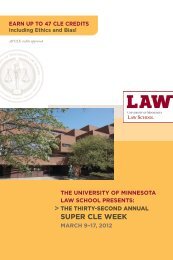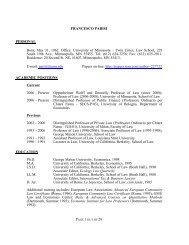Enabling Private Ordering - the University of Minnesota Law School
Enabling Private Ordering - the University of Minnesota Law School
Enabling Private Ordering - the University of Minnesota Law School
Create successful ePaper yourself
Turn your PDF publications into a flip-book with our unique Google optimized e-Paper software.
22 MINNESOTA JOURNAL OF INT’L LAW [Vol. 18:1<br />
up credible commitments <strong>of</strong> <strong>the</strong> host State vis-à-vis a foreign<br />
investor. 44<br />
The possibility <strong>of</strong> bringing a claim in <strong>the</strong> investor’s home<br />
jurisdiction or in o<strong>the</strong>r third-country courts is <strong>of</strong>ten equally<br />
limited. Here, <strong>the</strong> concept <strong>of</strong> sovereign equality compromises<br />
effective dispute resolution because <strong>the</strong> judiciary outside <strong>the</strong><br />
host State is <strong>of</strong>ten reluctant to subject foreign sovereigns to fullfledged<br />
judicial scrutiny and control. Various instruments, in<br />
particular state immunity and doctrines <strong>of</strong> judicial restraint,<br />
such as <strong>the</strong> act <strong>of</strong> state doctrine, constitute significant limits to<br />
subjecting foreign States to third-country jurisdiction. 45<br />
Fur<strong>the</strong>rmore, third-country courts <strong>of</strong>ten exercise judicial<br />
restraint in view <strong>of</strong> <strong>the</strong> foreign relations interests <strong>of</strong> <strong>the</strong>ir own<br />
government and are thus reluctant to subject foreign sovereigns<br />
to full-fledged judicial scrutiny. Courts outside <strong>the</strong> host State<br />
are, <strong>the</strong>refore, equally incapable <strong>of</strong> providing effective<br />
enforcement mechanisms that could back up <strong>the</strong> credibility <strong>of</strong><br />
promises a host State makes vis-à-vis foreign investors.<br />
44. Exceptions to <strong>the</strong>se observations exist, in particular in countries with a<br />
well-developed judicial system that provides for effective and independent protection<br />
against government conduct. This may also account for <strong>the</strong> non-inclusion <strong>of</strong> an<br />
investor-State dispute settlement mechanism in <strong>the</strong> recent United States-Australia<br />
Free Trade Agreement. See William S. Dodge, Investor State Dispute Settlement<br />
Between Developed Countries: Reflections on <strong>the</strong> Australia-United States Free Trade<br />
Agreement, 39 VAND. J. TRANSNAT’L L. 1 (2006).<br />
45. See M. SORNARAJAH, THE PURSUIT OF NATIONALIZED PROPERTY, 253–301<br />
(1986). Specifically on <strong>the</strong> situation in <strong>the</strong> United States, see Ronald Mok, Comment:<br />
Expropriation Claims in United States Courts: The Act <strong>of</strong> State Doctrine, <strong>the</strong><br />
Sovereign Immunity Doctrine, and <strong>the</strong> Foreign Sovereign Immunities Act. A<br />
Roadmap for <strong>the</strong> Expropriated Victim, 8 PACE INT’L L. REV. 199 (1996). Under <strong>the</strong><br />
U.S. act <strong>of</strong> state doctrine for example, “<strong>the</strong> Judicial Branch will not examine <strong>the</strong><br />
validity <strong>of</strong> a taking <strong>of</strong> property within its own territory by a foreign sovereign<br />
government . . . in <strong>the</strong> absence <strong>of</strong> a treaty or o<strong>the</strong>r unambiguous agreement<br />
regarding controlling legal principles, even if <strong>the</strong> complaint alleges that <strong>the</strong> taking<br />
violates customary international law.” Banco Nacional de Cuba v. Sabbatino, 376<br />
U.S. 398, 421 (1964). The political question doctrine results in <strong>the</strong> self-restraint <strong>of</strong><br />
courts in <strong>the</strong> United States regarding foreign policy issues that. See Baker v. Carr,<br />
369 U.S. 186, 212 n.31 (1962) (“The conduct <strong>of</strong> <strong>the</strong> foreign relations <strong>of</strong> our<br />
Government is committed by <strong>the</strong> Constitutions to <strong>the</strong> Executive and Legislative—<br />
<strong>the</strong> ‘political’—Departments <strong>of</strong> <strong>the</strong> Government, and <strong>the</strong> propriety <strong>of</strong> what may be<br />
done in <strong>the</strong> exercise <strong>of</strong> this political power is not subject to judicial inquiry or<br />
decision.”) (citing Oetjen v. Central Lea<strong>the</strong>r Co., 246 U.S. 297, 302 (1918)).<br />
Comparable doctrines also exist under o<strong>the</strong>r domestic legal systems.


